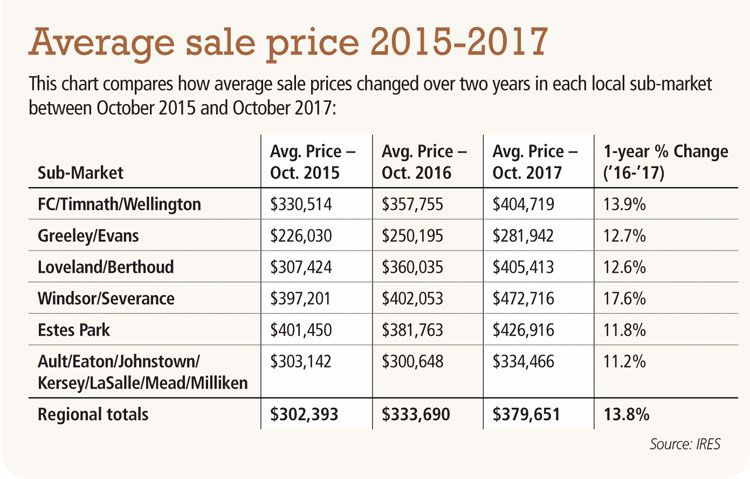What do you mean home prices declined?

 If you’ve been tracking headlines on the business pages in recent months, perhaps you were caught off guard by the news that home prices declined in some Front Range communities.
If you’ve been tracking headlines on the business pages in recent months, perhaps you were caught off guard by the news that home prices declined in some Front Range communities.
After all, isn’t the market still blazing hot? And haven’t Fort Collins and Greeley and Boulder and Denver been experiencing some of the fastest appreciating housing prices around the country?
First, the answer to these two questions is yes. And no, you didn’t imagine the headline about prices declining. Briefly, while the overall market remains at a steady boil, there are upper end neighborhoods where higher-priced houses are selling at slower rates. Consequently, the average prices for the surrounding community slipped a notch or two from the previous month. Most recently, we saw that phenomenon unfold late this summer in parts of Northern Colorado.
SPONSORED CONTENT
The many benefits of simple, coordinated healthcare
Kaiser Permanente combines health care and coverage in one connected system to maximize employee health and minimize employer costs.
It’s a reminder that any regional real estate market is made up of sub-markets — distinct neighborhoods, home styles, and price ranges — that behave differently, sometimes in the same square mile. Additionally, we’ll also point out that upper-end markets are slower than the overall market in most parts of the country.
Let’s take a closer look at what that means for Northern Colorado sub-markets.
As you’ve read in this space previously, the standard for a “balanced” housing market is six months of inventory. In other words, enough supply available to meet the needs of homebuyers for six months based on the historic pace of home sales in that market.
Locally, the inventory for homes priced at $400,000 or less is at a fraction of that six-month standard. Fort Collins is at 1.89 months, Greeley at 2.47 months, and Loveland at 1.75 months.
But if you look at homes priced at $700,000 or more, the inventory is ample — nine months in Fort Collins, 9.38 months in Greeley, and 6.97 months in Loveland.
We see four factors at work to slow down the upper-end market, locally and across the country:
Demographics. Remember the wave of 80 million baby boomers who came of age in the ‘80s and ‘90s and early 2000s to build most of these high-end homes? Well, only 46 million Gen Xers have come along to buy these homes. It is simple supply and demand.
Psychographics. As baby boomers amassed wealth, they aspired to live in the large homes, just like they saw on the TV shows such as “Dallas” and “Dynasty.” As a result, the “McMansion” craze was set in motion. Contrast that with the Gen Xers watching “Friends” — enjoying life in a loft and sharing good times with their besties rather than buying a big house.
Fashion and age. Many high-end homes were built more than 20 years ago and lag the latest fashion and technology trends. As tastes change for design and telecommunications, buyers may see these homes as a “project.”
Operating costs. Many Gen Xers are expressing concern about the cost of operating a large home. And if Congress limits the home interest deduction to a mortgage of $500,000 or less and eliminates the deduction of property taxes, this concern will be elevated.
With these influences behind today’s home-buying decisions, we’ve seen a dual market emerge. The good news? If you’re in position to purchase your dream home, these conditions in the high-end price range — plus continuing low interest rates — make for the best “move-up” market in 40 years. And if you’re selling a high-end home, there is still a market. It’s just more competitive than the overall market, and just calls for a little more patience.
Larry Kendall is co-founder of The Group Inc. Real Estate and is creator of Ninja Selling. Reach him at 970-229-0700 or via www.thegroupinc.com.
 If you’ve been tracking headlines on the business pages in recent months, perhaps you were caught off guard by the news that home prices declined in some Front Range communities.
If you’ve been tracking headlines on the business pages in recent months, perhaps you were caught off guard by the news that home prices declined in some Front Range communities.
After all, isn’t the market still blazing hot? And haven’t Fort Collins and Greeley and Boulder and Denver been experiencing some of the fastest appreciating housing prices around the country?
First, the answer to these two questions is yes. And no, you didn’t imagine the headline about prices declining. Briefly, while the overall market remains at…
THIS ARTICLE IS FOR SUBSCRIBERS ONLY
Continue reading for less than $3 per week!
Get a month of award-winning local business news, trends and insights
Access award-winning content today!

